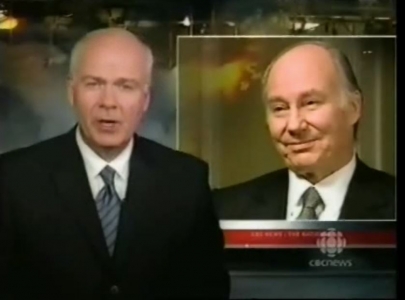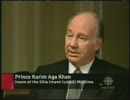Note: Audio is placed below the main text, when available.
AGA KHAN GRANTS AN INTERVIEW TO PETER MANSBRIDGE AT CBC - 2006-10-26
INTERVIEW of H.H. The Aga Khan, Ottawa, Canada - Extract: '...in recent years, I think we're seeing more and more around the world that no matter what the nature of the conflict is, ultimately there is a rejection of pluralism as one of the components, whether it's tribalism, whether it's conflict amongst ethnic groups, whether it's conflict amongst religions. The failure to see value in pluralism is a terrible liability...'
THE NATIONAL (CBC-TV), Toronto, 26 Oct 06, Reach: 550,000, Time: 22:00, Length: 08 MIN., Ref# 734186-18
Anchor/Reporters: PETER MANSBRIDGE
- The Aga Khan. A feature interview with the spiritual leader of
PETER MANSBRIDGE (HOST) :
- The Aga Khan. A feature interview with the spiritual leader of the world's 20 million Ismaili Muslims. -
- We'll be back with this: The Aga Khan shares his thoughts on Canadians and the world's efforts in Afghanistan.
PRINCE KARIM AGA KHAN (IMAM OF THE ISMAILI MUSLIMS) :
I think Canada has been perhaps too humble. -
PETER MANSBRIDGE (HOST) :
That was Prime Minister Harper with Prince Karim Aga Khan yesterday announcing a new joint project called the joint centre for pluralism. The Aga Khan is imam to 80,000 Ismaili Muslims in Ottawa, 20 million worldwide. Earlier today I sat down with the Aga Khan to talk about a whole range of issues from Canada to Afghanistan. (Interview): Canada's role in Afghanistan is well known, has been since 9/11. So is the Aga Khan Foundation, which is in there in a big way in development matters. The question is simple really: With all the help that's been given to Afghanistan, why is the Taliban resurging, not only back in numbers, but back in some sense of popularity? Why is that happening?
PRINCE KARIM AGA KHAN (IMAM OF THE SHIA IMAMI ISMAILI MUSLIMS) :
I think there are a number of reasons, but the one that I would put forward as the most immediate is the slow process of reconstruction. There was a lot of hope that once there was regime change and a new government and a political process that had been completed, et cetera, quality of life would change, and it hasn't changed quickly enough. It's taken much more time than I think many of us had hoped to get to isolated communities in Afghanistan and improve their quality of life. It's an organizational problem even amongst the donor countries. There have been differences of opinion. The management of the drug problem has not been a united effort by any means. So there are a number of things that have slowed up the process, and there is still acute pockets of poverty in Afghanistan, people who don't have enough food, people who don't have access to any education, any health care, and it's clear this sort of frustration causes bitterness and the search for other solutions.
PETER MANSBRIDGE (HOST) :
Well, is there time to turn it around? Because you get a sense that the pendulum has swung back considerably in the last year or so. You're friends with Hamid Karzai. I've talked to him a couple of times in the last couple of years, the last time just a month ago. There's this growing sense among the Canadian people as well, frustration, and a belief that it's a war that cannot be won.
PRINCE KARIM AGA KHAN (IMAM OF THE SHIA IMAMI ISMAILI MUSLIMS) :
I would beg to differ on that. I think what we're seeing in Afghanistan, at least from my own network of activities, is an increasingly visible, two-speed process where in the north and the west you're beginning to see quantifiable change. In the east and the south, you're not seeing that. And that two-speed change is going to have to be managed with great care. But it's not a good reason to give up by any means.
PETER MANSBRIDGE (HOST) :
Can you do both at the same time? That's the debate in Canada, to run a military operation, talking specifically about the south, while trying to introduce aid and development in an area that is not secure.
PRINCE KARIM AGA KHAN (IMAM OF THE SHIA IMAMI ISMAILI MUSLIMS) :
Very difficult to do. But necessary. I mean, every step counts. Certainly in area where there's insecurity. I think the availability for populations to participate in these sort of activities does go down when quality of life changes, and I believe the same thing with regard to the drug problem.
PETER MANSBRIDGE (HOST) :
How much of the problem in Afghanistan is a result of the decision on the part of the Americans and the British to move into Iraq?
PRINCE KARIM AGA KHAN (IMAM OF THE SHIA IMAMI ISMAILI MUSLIMS) :
Very substantial indeed. The invasion of Iraq was something which has mobilized what we call the community of Muslims around the world. Every Muslim that I have ever talked to has felt engaged by this.
PETER MANSBRIDGE (HOST) :
On what level? What do you mean?
PRINCE KARIM AGA KHAN (IMAM OF THE SHIA IMAMI ISMAILI MUSLIMS) :
Baghdad is one of the great historic cities of the Islamic world. Iraq is not a new country. It's part of the history of our civilization. It's been a pluralist country. Great philosophers, great historians, great scientists. Reverse the question again. What would the Christian world think if a Muslim army attacked Rome? I think there would be a general reaction in the Christian world, not just an Italian reaction.
PETER MANSBRIDGE (HOST) :
But it seems that, even in the Muslim world, that invasion has caused major divisions, the clash inside Islam itself between Shi'a and Sunni.
PRINCE KARIM AGA KHAN (IMAM OF THE SHIA IMAMI ISMAILI MUSLIMS) :
Well, that was entirely predictable. Entirely predictable. There was nothing unpredictable. What you were effectively doing is replacing a Sunni minority government in the country that had a Shi'a demographic majority. Again, take the case out of its situation. What would happen -- and I'm sorry to come back to this, but it's important -- if a Muslim army went in to Northern Ireland and replaced one Christian interpretation by another? Imagine the fallout that that would cause in the Christian world itself.
PETER MANSBRIDGE (HOST) :
So what happens now? Can Iraq be put back together? And who would be doing the putting back together?
PRINCE KARIM AGA KHAN (IMAM OF THE SHIA IMAMI ISMAILI MUSLIMS) :
I think that's a very, very difficult question, and I would not want to predict the answer because I think that the whole process of change in Iraq has regional dimensions which have got to be managed. They're not just national dimensions in Iraq. Those regional dimensions also were predictable, let's be quite frank about it, and I think they're going to need to be managed with very, very great care.
PETER MANSBRIDGE (HOST) :
We talked early, just briefly touched on the new global centre for pluralism which will be established here in Canada through the Aga Khan Foundation and the people of Canada through the government of Canada. What is your hope for that? What do you see that doing, accomplishing?
PRINCE KARIM AGA KHAN (IMAM OF THE SHIA IMAMI ISMAILI MUSLIMS) :
Well, I hope that this centre will learn from the Canadian history of pluralism the bumpy road that all societies have in dealing with pluralist problems, the outcomes, and offer much of the world new thoughts, new ways of dealing with issues, anticipating the problems that can occur because in recent years, I think we're seeing more and more around the world that no matter what the nature of the conflict is, ultimately there is a rejection of pluralism as one of the components, whether it's tribalism, whether it's conflict amongst ethnic groups, whether it's conflict amongst religions. The failure to see value in pluralism is a terrible liability.
PETER MANSBRIDGE (HOST) :
Why Canada?
PRINCE KARIM AGA KHAN (IMAM OF THE SHIA IMAMI ISMAILI MUSLIMS) :
Because I think Canada is a country that has invested in making this potential liability become an asset, and I think that Canada has been perhaps too humble in its own appreciation of this global asset. It's a global asset, and few countries, if any have been as successful as Canada has. Bumpy though the road is, and, as I said earlier, it's always going to be an ongoing task.
PETER MANSBRIDGE (HOST) :
For the full interview with the Aga Khan, you can check out "Mansbridge One on One." It's running on the CBC main network on Newsworld this weekend at the times listed right there on your screen.
WORDS: 1343 Media Search Order: 125354 Sent:
| Attachment | Size |
|---|---|
| Capture.JPG | 38.26 KB |
| dasdsa.JPG | 33.27 KB |
- 7363 reads
 Ismaili.NET - Heritage F.I.E.L.D.
Ismaili.NET - Heritage F.I.E.L.D.
